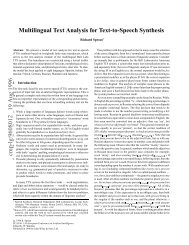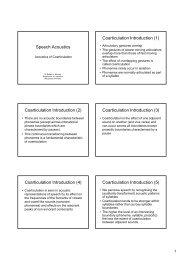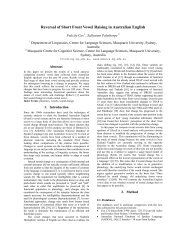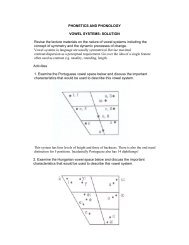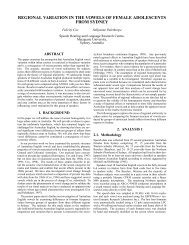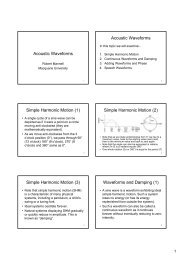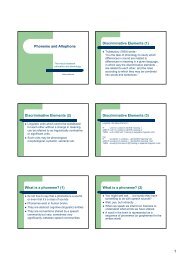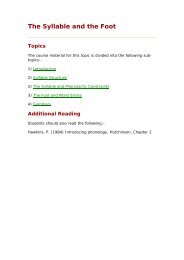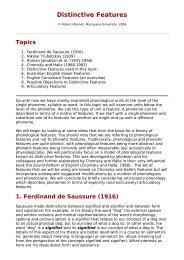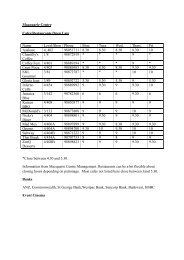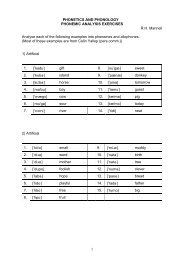Festival Speech Synthesis System: - Speech Resource Pages
Festival Speech Synthesis System: - Speech Resource Pages
Festival Speech Synthesis System: - Speech Resource Pages
You also want an ePaper? Increase the reach of your titles
YUMPU automatically turns print PDFs into web optimized ePapers that Google loves.
aa-ll &aa-l<br />
This states that the diphone aa-ll should actually use the diphone aa-l. Note they are a number of ways to specify<br />
alternates for missing diphones an this method is best used for fixing single or small classes of missing or broken<br />
diphones. Index entries may appear anywhere in the file but can't be nested.<br />
Some checks are made one reading this index to ensure times etc are reasonable but multiple entries for the same<br />
diphone are not, in that case the later one will be selected.<br />
[ < ] [ > ] [ > ] [Top] [Contents] [Index] [ ? ]<br />
20.3 Database declaration<br />
There two major types of database grouped and ungrouped. Grouped databases come as a single file containing the<br />
diphone index, coeficinets and residuals for the diphones. This is the standard way databases are distributed as voices<br />
in Festoval. Ungrouped access diphones from individual files and is designed as a method for debugging and testing<br />
databases before distribution. Using ungrouped dataabse is slower but allows quicker changes to the index, and<br />
associated coefficient files and residuals without rebuilding the group file.<br />
A database is declared to the system through the command us_diphone_init. This function takes a parameter<br />
list of various features used for setting up a database. The features are<br />
name<br />
An atomic name for this database, used in selecting it from the current set of laded database.<br />
index_file<br />
A filename name containing either a diphone index, as descripbed above, or a group file. The feature<br />
grouped defines the distinction between this being a group of simple index file.<br />
grouped<br />
Takes the value "true" or "false". This defined simple index or if the index file is a grouped file.<br />
coef_dir<br />
The directory containing the coefficients, (LPC or just pitchmarks in the PSOLA case).<br />
sig_dir<br />
The directory containing the signal files (residual for LPC, full waveforms for PSOLA).<br />
coef_ext<br />
The extention for coefficient files, typically ".lpc" for LPC file and ".pm" for pitchmark files.<br />
sig_ext<br />
The extention for signal files, typically ".res" for LPC residual files and ".wav" for waveform files.<br />
default_diphone<br />
The diphone to be used when the requested one doesn't exist. No matter how careful you are you should<br />
always include a default diphone for distributed diphone database. <strong>Synthesis</strong> will throw an error if no diphone<br />
is found and there is no default. Although it is usually an error when this is required its better to fill in<br />
something than stop synthesizing. Typical values for this are silence to silence or schwa to schwa.<br />
alternates_left<br />
A list of pairs showing the alternate phone names for the left phone in a diphone pair. This is list is used to<br />
rewrite the diphone name when the directly requested one doesn't exist. This is the recommended method for<br />
dealing with systematic holes in a diphone database.<br />
alternates_right<br />
A list of pairs showing the alternate phone names for the right phone in a diphone pair. This is list is used to<br />
rewrite the diphone name when the directly requested one doesn't exist. This is the recommended method for<br />
dealing with systematic holes in a diphone database.<br />
An example database definition is



